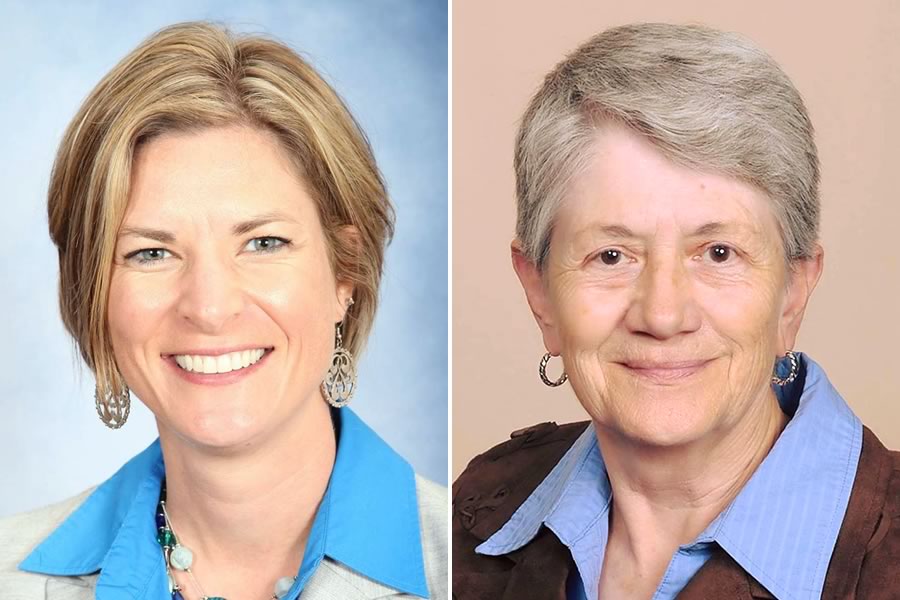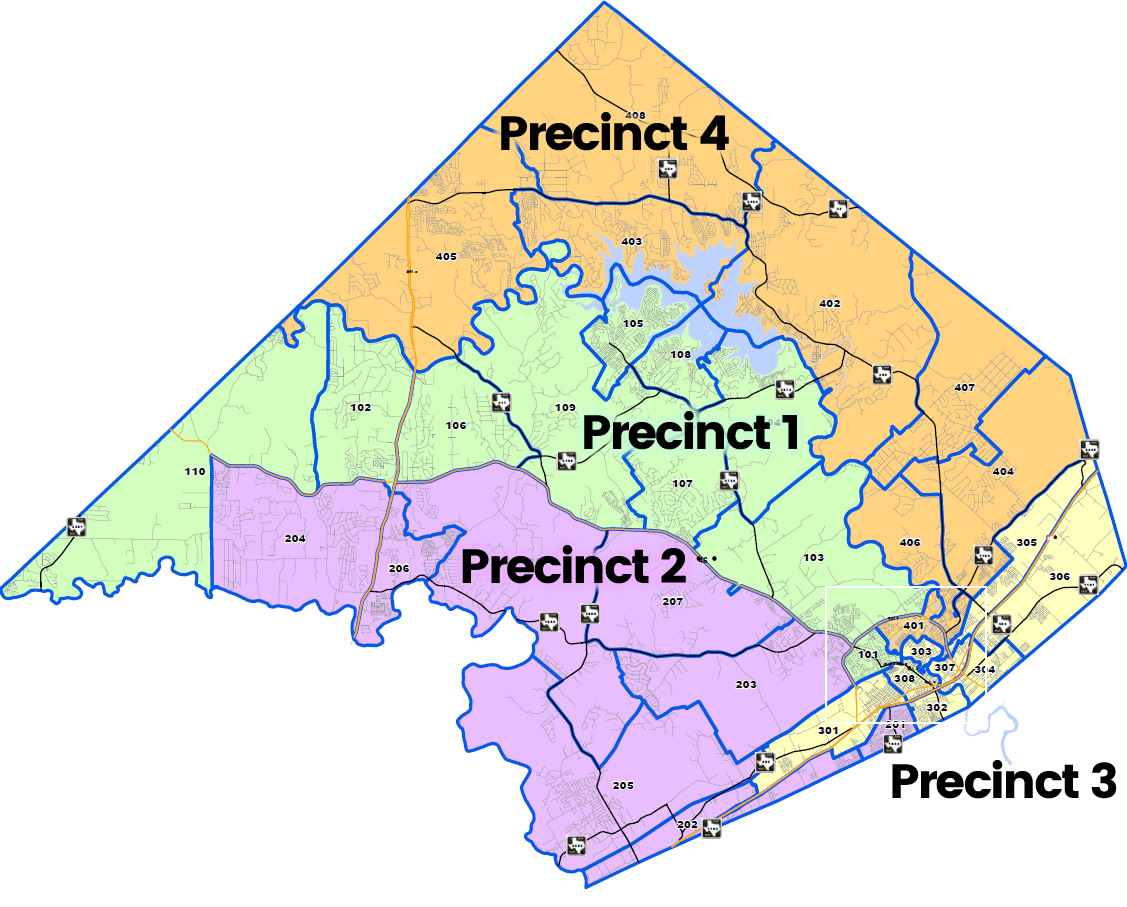Jen Crownover vs. Dorothy Carroll (2018)
In March, Precinct 4 Commissioner Jen Crownover stated that the county commissioners “don’t have any tools in the toolbox” to help citizens opposing the Vulcan quarry, and she promised support should they find the tools. However, when presented with tools like the contested case hearing request and numerous examples of other counties that have successfully utilized hearing requests and moratoriums, Ms. Crownover and the other Comal County commissioners still failed to take any meaningful action to support their constituents.
Ms. Crownover seems to agree with some of our positions when it comes to local control and county-funded preservation of creeks and watersheds, but to our knowledge has initiated no formal action during her tenure as commissioner toward either of these efforts. In response to a proposed concrete plant in Spring Branch, she submitted a well-written public comment citing many of the problems with TCEQ. But following this meeting, pleas to her office asking for support were met with silence.
Dorothy Carroll supports local authority to place limitations on quarries and aggregate plants and is focused on increasing government transparency at the county level.
We have no recommendation in this race.

Candidate Questionnaire
Preserve Our Hill Country Environment sent a candidate questionnaire to both candidates in late August, then followed up with each candidate multiple times by email and phone. Responses from each candidate are shown below verbatim. As per instructions, responses have not been edited for spelling, punctuation, or grammatical errors. “No response received” is shown for any candidate who did not reply by the October 15 deadline.
Question 1. Applicants for TCEQ air quality permits often face opposition from a community when the proposed facility, such as a rock crusher/quarry or cement plant, will significantly impact area residents. In such cases, Texas law allows counties to directly request a contested case hearing and participate with the county itself as an “affected person” (Texas Administrative Code, Title 30, Subchapter F). Texas counties such as Kendall, Kerr, and Burnet, have supported their citizens by requesting contested case hearings. Did you (for challengers, would you) directly request a contested case hearing on TCEQ permit application number 147392L001 (Vulcan Construction Materials) with Comal County as an affected person?
Crownover: NO. Comal County did not file for a contested case hearing, because in this type of TCEQ permit, we are not permitted to, as such, under TCEQ rules and also by the Texas Administrative Code. We did, however, on behalf of our citizens and as a unified court, pass a resolution requesting TCEQ to review the Vulcan permit request with utmost scrutiny, and to monitor and enforce their rules as they are defined to the strictest interpretation possible, in order to protect our citizens and our very sensitive environment. We also researched the other counties mentioned here—and their permits/contested case hearing requests were either in other classifications, or not permitted (and as a result–not granted) by TCEQ. In our research, we found that Comal County was not eligible, under the Texas Administrative Code, to directly request the contested case hearing. Under this code, it is plainly stated, an interest common to members of the general public does not qualify as a personal justiciable interest. Therefore, if we were to request the hearing, it would be rejected anyways.
Carroll: YES. I definitely would have voted to request a contested case hearing naming Comal County as an affected person/party, on TCEQ permit application number 147392L001 (Vulcan Construction Materials) had I been a commissioner at the time. In the event there exists a valid legal prohibition to a commissioner, acting independently in such an instance, as I have yet to research, I would have argued for, and voted for, the Commissioners Court to request a contested case hearing on TCEQ permit application number 147392L001 (Vulcan Construction Materials).
Question 2. Texas counties have a number of tools available when it comes to protecting the health and safety of their citizens against the well-documented risks of increased particulate matter air pollution from quarries. In addition to contested case hearings, some of these tools include the ability to issue a county-wide moratorium, form a commission to require TCEQ coordination with local authorities, and create a comprehensive county development plan. Which of these tools have you used (for challengers, would you use) to support your constituents who oppose the proposed Vulcan Materials quarry in Comal County? (Selection options: Moratorium, Commission, Development Plan, Other.)
Crownover: NONE OF THESE. These choices illustrate the biggest differences between counties and cities. County government is very basically set up as a local branch of state government, and can only do what the state legislature allows. City government is created by and for the people—on top of the layer of the county, and have many more powers and authorities, because they are from the people up. City governments have the abilities to do things like moratoriums, master development plans, commissions, etc, because they write their own rules (which are allowable, as long as they are not breaking those of the county, state, or federal levels). County government is more of a ‘mother, may I’ form of government, and our authorities come directly from laws passed in the legislature. At this time, moratoriums and master plans are not allowable by statute. Commissions can be created, but are largely suggestive in nature and have no real authority or enforcement abilities. So, legally, none of these are options for Comal County. Land rights are some of the most sacred and dear freedoms that are enjoyed in the unincorporated areas of Texas counties. Many folks retreat to these areas to live because of the absence of regulation. In general, this creates harmony in our great state…until someone does not like what is happening on the other side of the fence line.
Carroll: MORATORIUM, COMMISSION, DEVELOPMENT PLAN, OTHER. Petition, until successful, the Texas State Legislature and Legislators to write, propose and pass legislation that gives Comal County government specific authority to limit and regulate or prohibit/ban incompatible county land use to ensure land use in the county is limited to uses that are environmentally sustainable and pose no threat or potential threat to the health and safety of current or future residents of the county. And, additionally, the authority to prohibit/ban any new, additional aggregate companies to begin operations in the county and, further, to prohibit/ban the expansion or relocation of any aggregate operations or quarries currently in operation in Comal County.
Question 3. Westward Environmental provides consulting services to aggregate companies such as Vulcan. Texas Aggregates and Concrete Association (TACA) is a lobbying group representing Vulcan Construction Materials and other aggregate companies. Did you communicate with or have contact with any representatives of Vulcan, Westward, TACA, or their subsidiaries prior to public notice of permit application number 147392L001 in July 2017?
Crownover: NO. Not to my knowledge.
Carroll: NO.
Question 4. Comal County is experiencing rapid growth, much of which is occurring in unincorporated areas. County commissioners have claimed they have insufficient authority when it comes to regulating incompatible land use or protecting citizens against threats to their health and property. What specific actions have you taken (for challengers, would you take) to rectify this lack of authority and foster a reasonable and predictable approach to development that protects all property owners?
Crownover: Since taking office in 2015, I have represented my precinct in an open and honest manner. When I do not know the answer to a question, I research it. When I am not familiar with a topic, I explore it. When I don’t understand a matter, I ask questions, and if the answers do not make sense, I examine the reasons why. I never promise anything I cannot deliver on, and when I cannot legally do what is being asked by a citizen, I do my best to educate them as to why, and how things could (theoretically) be changed. Much of this is achieved through establishing and maintaining excellent rapport with our State Representative and Senator—especially with issues that the county cannot legally dictate. With each issue that arises, where there is a question of statutory authority, or a possible lack thereof when it may be needed. Let’s use fireworks as an example—there are very specific rules regarding when Counties can or cannot ban fireworks of different classifications. In our rapidly growing county, and as our subdivisions develop out, this is a topic that may need action from the legislature to give us added authority for the sake of the safety and welfare of our citizens and their property. I have been in contact with our state representative and senator about this topic, and many others, as they have come up over the years, for evaluation and action on our citizens’ behalf.
Carroll: Immediately issue a county-wide moratorium. Utilize the moratorium delay period to form a commission requiring TCEQ coordination with local authorities and creating a comprehensive development plan for Comal County. While, at the same time, petitioning the Texas State Legislature and Legislators, until successful, to write, propose and pass legislation that gives Comal County government specific authority to limit and regulate or prohibit/ban incompatible county land use to ensure land use in the county is limited to uses that are environmentally sustainable and pose no threat or potential threat to the health and safety of current or future residents of the county. Legislation that also includes the authority to prohibit/ban any new, additional aggregate companies to begin operations in the county and, further, to prohibit/ban the expansion or relocation of any aggregate operations or quarries currently in operation in Comal County. The health and longevity of the Edwards Aquifer must be protected; Comal County residents’ health (human, animal and plants) and the county economy is dependent on the health of the county’s overall environment.
Other Key Races
Preserve Our Hill Country Environment is a 501(c)(4) nonprofit organization formed to preserve, protect, and restore the land, water, air, wildlife, unique features, and quality of life in the Texas Hill Country from the aggressive and insufficiently regulated expansion of the aggregate industry.
Related News
Comal County Commissioner, Precinct 3 Voter Guide
October 2, 2020
Colette Nies and Kevin Webb are candidates for Comal County Commissioner, Precinct 3, in the 2020 general election. Voter guide and candidate questionnaire responses.
Comal County Commissioner, Precinct 1 Voter Guide
October 1, 2020
Lindsay Poisel, Donna Eccleston, and Ivan Foster are candidates for Comal County Commissioner, Precinct 1, in the 2020 general election. Voter guide and candidate questionnaire responses.
Comal County Commissioner, Precinct 1 Voter Guide
February 10, 2020
Donna Eccleston, Richard Smith, and Lindsay Poisel are candidates for Comal County Commissioner, Precinct 1, in the 2020 primary election. Voter guide and candidate questionnaire responses.
